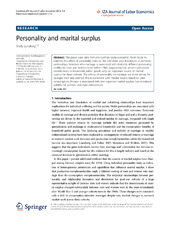| dc.contributor.author | Lundberg, Shelly | eng |
| dc.date.accessioned | 2013-05-30T11:12:13Z | |
| dc.date.available | 2013-05-30T11:12:13Z | |
| dc.date.issued | 2012-10-09 | eng |
| dc.Published | IZA Journal of Labor Economics 2012, 1:3 | eng |
| dc.identifier.issn | 2193-8997 | |
| dc.identifier.uri | https://hdl.handle.net/1956/6678 | |
| dc.description.abstract | This paper uses data from the German Socio-economic Panel Study to examine the effect of personality traits on the formation and dissolution of domestic partnerships. Selection into marriage is associated with distinctly different personality profiles for men and women born before 1960, suggesting that gender-specialized contributions to household public goods were an important source of marital surplus for these cohorts. The effects of personality on marriage are more similar for younger men and women; this is consistent with marital returns based on joint consumption. Divorce is associated with low expected marital surplus, low emotional stability for women, and male extroversion. | en_US |
| dc.language.iso | eng | eng |
| dc.publisher | Springer Open | eng |
| dc.rights | Attribution CC BY | eng |
| dc.rights.uri | http://creativecommons.org/licenses/by/2.0/ | eng |
| dc.subject | J12 | eng |
| dc.title | Personality and marital surplus | eng |
| dc.type | Peer reviewed | en_US |
| dc.type | Journal article | en_US |
| dc.description.version | publishedVersion | |
| dc.rights.holder | Copyright 2012 Lundberg; licensee Springer. | en_US |
| dc.identifier.doi | https://doi.org/10.1186/2193-8997-1-3 | |
| dc.source.journal | IZA Journal of Labor Economics | |
| dc.source.40 | 1 | |

